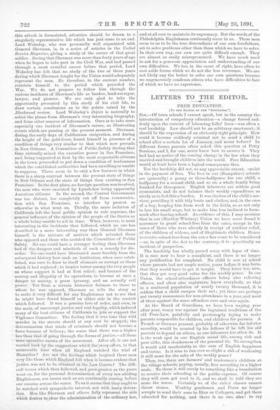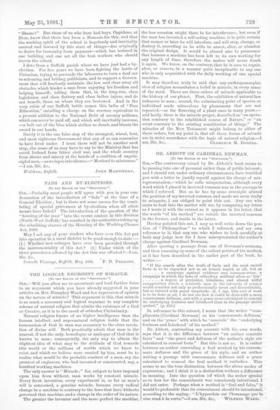LETTERS TO THE EDITOR.
FREE EDUCATION.
[re TUB EDITOR OF TUB " SPEOTATOR.1
Sin,—Of town schools I cannot speak, but in the country the introduction of compulsory education—a change forced sud- denly upon the current of labouring folks' lives—was often a. real hardship. Law shbuld not be an arbitrary enactment; it- should be the expression of an obviously right principle. How could it become suddenly criminal not to send a child to school after a certain 1st of January, and never before P In different forms, parents often asked this question at Petty Sessions, and I, for one, never knew how to answer it. They had had no notice of the coming change in the law when they married and brought children into the world. Free Education would at least have been a logical consequence then.
But the hardship did not, to any appreciable extent, .:onsist in the payment of fees. The fees in our (Hampshire) schools are (generally) a penny or three-halfpence for one child, a halfpenny for a second child, and so on, a whole family being. franked for threepence. English labourers are seldom good economists, and do not balance their weekly expenditure so. nicely as to feel this a burden. It was the loss of the child's ser- vices, providing it with tidy boots and clothes, and, in the case of a boy, keeping him from work in the fields, so as not only to lose his small wage, but to make him less inclined to farm- work after leaving school. As evidence of this, I may mention that in our (Hartley-Wintney) Union we have never found it necessary to grant school-fees from the rates, except in the cases of those who were already in receipt of outdoor relief,. of the children of widows, and of illegitimate children. Hence to receive school-fees from the rates has come to be considered —as, in spite of the Act to the contrary, it is—practically an incident of pauperism.
The hardship has wholly passed away with lapse of time. It is rare now to hear a complaint, and there is no longer any justification for complaint. No child is now at school whose parents had not ample notice, years before it was born,- that they would have to get it taught. They know too, now,. that they get very good value for the weekly pence. In our Union, the school-attendance officers being also relieving. officers, and often also registrars, know everybody, so that. in a scattered population of nearly twenty thousand, it is seldom that a child escapes their net ; yet there are perhaps not twenty summonses for non-attendance in a year, and most of these against the same offenders over and over again.
At the Board of Guardians, we have been waging, year after year, weary war against the ingrained traditions of the old Poor-Law, painfully and persistently trying to make parents responsible for children, and children for parents. A French or German peasant, probably of otherwise far inferior morality, would be scouted by his fellows if he left his old parents to depend on others, as our labourers too often do. It is the weak spot in our English social life, among rich and poor alike, this slenderness of the parental tie. To strengthen it would add incalculably to the sum of English happiness and virtue. Is it wise to run ever so slight a risk of weakening it still more for the sake of the weekly pence ?
Then, too, there are farmers' and tradesmen's children at the village schools, paying, usually, fees according to a higher scale. To these it will surely be something like a humiliation to receive their schooling at the public expense. Of course they will soon get used to it, and we shall be told they are none the worse. Certainly we of the richer classes cannot throw stones. Wealthy gentlemen and Peers no longer scruple to send their sons to Eton as Collegers, and get them educated. for nothing, and there. is no one, alas ! to cry " Shame!" But those of us who have had boys, Oppidans, at Eton, know that there has been a Nemesis for this, and that the working spirit of the school is hopelessly and inevitably marred and lowered by this state of things—due originally to desire for immunity from payment—which bast isolated in one building and one set all the best workers who should leaven the school.
I date from a Suffolk parish where we have just had a by- election. For five years we have been fighting the battle of Unionism, hying to persuade the labourers to turn a deaf ear to scheming and bribing politicians, and to support a Govern- ment that will fearlessly maintain the law, and clear away all obstacles which hinder a man from enjoying his freedom and helping himself; telling them that, in the long-run, class legislation and class flattery and class bribes injure, and do not benefit, those on whom they are bestowed. And in the very crisis of our Suffolk battle comes this bribe of " Free Education," entailing a charge on the revenue equivalent to a present addition to the National Debt of seventy millions, which can never be paid off, and which will inevitably increase, —a bolt out of the blue which strikes us dumb, and blunts the sword in our hands.
Surely it is the one false step of the strongest, wisest, best, 'and most righteous Government that any of us can remember to have lived under. I trust there will not be another such step, else some of us may have to say to the Ministry that has saved Ireland from bitter civil war, and the whole country from shame and misery at the hands of a coalition of unprin- cipled men,—as we lapse into silence,—" Morituri to salutamus." —I am, Sir, &e.,



































 Previous page
Previous page